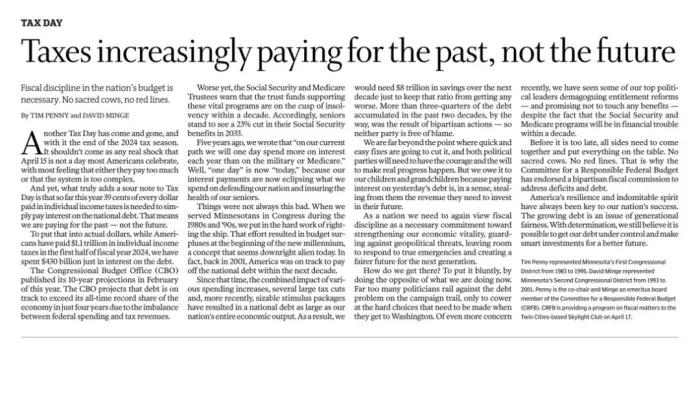A Conference Committee Wishlist
With conference committee meetings underway, many are weighing in with their take on what should be accomplished. On Friday, Fareed Zakaria at CNN compiled a wishlist for Congress, with the help of commentators, analysts, and policy makers. The 12 contributors all had different takes on what the conference committee should address.
The dozen wishes are as follows:
- Create a national infrastructure bank: "This would create a mechanism by which you could have private sector participation in raising money, investing, and operating roads, trains and airports." – Fareed Zakaria, CNN
- Put the sequester on hold: "Turn off the destructive sequester for a year or two, without insisting all of it be paid for in the same time period. Set realistic spending caps, mandatory spending adjustments, and revenues consistent with that objective." – Thomas E. Mann, Brookings Institution
- Jobs, jobs, jobs!: "Cancel the sequester cuts that are set to destroy up to 1.6 million jobs for teachers, police, medical researchers, national security personnel, construction workers and others across the country. Include training programs to close the skills gap and needed upgrades to infrastructure, education, and energy systems." – Rep. Frederica Wilson (D-Fla.)
- Give our military resources it needs: "Reversing disastrous cuts and providing our military with the resources it needs to execute its missions should be the paramount objective of any budget negotiation." – Rep. J. Randy Forbes (R-Va.)
- Fix the budget process: "Everything should be on the table, including repealing or replacing the debt limit, redesigning the structure of congressional committees, and rethinking the ban on earmarks." – Donald Marron, Urban Institute
- Invest in basic research: "It’s time to reverse the March sequester, which will cut federal spending on R&D by $95 billion by 2021." – Bhaskar Chakravorti, Fletcher School, Tufts University
- Reform Social Security and Medicare: "Let seniors keep current benefits, but alter the programs for those who retire in 2023. Medicare needs to be reformed through competition. The retirement age for Social Security therefore needs to be gradually raised, and the indexing of benefits changed to reflect a more accurate level of prices in the economy rather than wages." – Diana Furchtgott-Roth, Manhattan Institute
- Drop the high stakes showdowns: "Any agreement that showed an ability of Congress to compromise, and provided some degree of automaticity to the debt limit extension, even for a period of time would be an important achievement." – Robert Kahn, Council on Foreign Relations.
- Major tax reform: "Tax reform should include family-friendly reforms and severe curtailment of popular tax breaks; corporate tax reform which significantly lowers the corporate rate (down to zero, ideally); and an increase in discretionary spending on socially valuable infrastructure, basic research, and other public goods." – Michael R. Strain, American Enterprise Institute
- Invest in high quality preschool: "Modernizing our deteriorating infrastructure and delivering high-quality preschool to all children are two of the best investments we can make in our future." – Harry Stein, Center for American Progress
- Slash farming ‘welfare’: "The current Direct Payments program and a related shallow loss program known as ACRE should be terminated. Crop insurance subsidies should be rolled back to pre-2001 levels and capped at $40,000 per farm." – Vincent Smith, Montana State University
- Tackle short and long term together: "For the short run, return government spending to pre-sequester levels and provide a modest level of additional stimulus by raising infrastructure spending. For the long run, take serious steps to reform Medicare and Social Security. Reform the tax code but also bring marginal rates to the vicinity of Clinton era levels." – Mark Gertler, NYU
We applaud these contributors for setting high expectations for the conference committee. We have stressed before that going into this negotiation process, conferees should not take anything off the table, including the policies in the wishlist above. CRFB recently published our own take on what we expect to see from the conference committee. Our half-dozen goals are as follows:
- Put the debt on a downward path as a share of GDP
- Set sustainable and responsible discretionary spending levels
- Use reconciliation to produce real deficit reduction and reform
- Focus on the long term
- Fix Social Security on a separate track
- Avoid budget gimmicks
The conference committee provides an opportunity for lawmakers to sit down and talk smartly about the problems our country faces, both in the near and long term. Although the House and Senate committee members differ in their budget proposals, both budget resolutions -- along with many alternate ones proposed -- put debt on a downward path. This conference should likewise put forth recommendations that put long-term debt on a downward path, while addressing current and future spending levels in a responsible and sustainable manner.
If the members of the conference committee work together, they can easily check some items off these wishlists.


